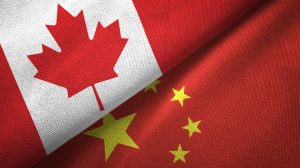As lawmakers in Canada meet to discuss the upcoming second anniversary of the introduction of the draconian National Security Law in Hong Kong, they will also consider the issue of Canadian pension funds passively investing in Chinese stocks and bonds linked to gross human rights violations.
Russia’s brutal invasion of Ukraine, which was sign-posted well in advance, should serve as a wake-up call for Western pension funds regarding the risks of economic dependency on authoritarian states, whose ideology and appetite for geopolitical risks vastly differ from the democracies they are in competition with.
Many investors were bullish the week before Russia’s invasion of Ukraine, doubling down on their investments and remaining skeptical that the West could unite around economic sanctions and wean itself off its addiction to Russian oil and gas. Yet, the latest agreement among the European Union on a collective oil and gas embargo has further demonstrated how quickly such assumptions can change, and how sage investors like BlackRock can end up losing over $17 billion of ordinary pensioners’ money.
In adopting an embargo, European leaders signaled the end of an incoherent approach to Russia, which arms Ukrainian soldiers but continues to finance Russian bombs through the purchase of oil and gas.
Such incoherence is similarly found when it comes to dealing with Xi Jinping’s China. Canada and its allies rightly condemn the human rights crackdown in Hong Kong, the detention camps in Xinjiang, and the military threats against Taiwan, but investors continue to passively invest in Chinese equities linked to Xinjiang and the People’s Liberation Army, as well as growing amounts of money in Chinese government bonds.
What conclusions should Xi Jinping draw when in May 2021 foreign ownership of Chinese government bonds reached an all-time high of over 3.6 trillion renminbi? Afterall, the purchase of these bonds directly finances the construction of detention camps, the national security crackdown in Hong Kong, and the militarization of the Taiwan Strait.
What does Xi make of Canada’s willingness to stand up for the rights of the Uyghurs when Canada’s leading federal, provincial, and university pension funds all have exposure to Chinese equities (like iFlytek and Dahua Technology) that have been blacklisted by the United States for their complicity in these gross human rights violations?
A new report released by Hong Kong Watch has found that, despite a commitment to uphold Environment, Social, and Governance (ESG) criteria, Canadian Pension Plan Investment Board, Canada’s Civil Service Superannuation Fund, British Columbia Investment Management Corporation, the Investment Management Corporation of Ontario, the Caisse de de dépôt et placement du Québec, the University of Toronto, the University of Alberta, Queens’ University, and the Alberta Investment Management Corporation, all have investments in Chinese equities that have been blacklisted and in some cases sanctioned by the U.S. government, as well as sizeable holdings in Alibaba and Tencent.
Of course, this exposure to questionable equities is not by accident, but rather sadly by design. The federal, provincial, and university pension funds named above all passively invest through index market trackers, including through MSCI’s Emerging Markets Index and the MSCI All Country World Index, who act as “publishers” creating the funds and selecting the equities they invest in.
This means that pension funds are effectively outsourcing investment decisions regarding Canadian pensioners’ money to third parties who claim to be independent and neutral, but are actively pumping billions of Canadian dollars into Chinese equities and bonds with little to no oversight or transparency.
Such an approach is unsustainable and is rightly leading to Canada’s largest pension funds facing growing criticism from human rights groups over the way they invest and how their investments in China meet previous ESG commitments.
Those groups have been joined in the last year by seasoned figures in the finance industry from Baroness Helena Morrisey in the U.K. to George Soros in the U.S., who have warned against the “blatant paradox” between claims to uphold ESG criteria and investments in Chinese businesses linked to forced labor.
It would be wrong to oppose pension investment in China outright, or to ignore the work that some Canadian investors are undertaking to ensure proper due diligence is being undertaken. However, there remains a strong case for Canada’s leading pension funds to review their approach to passive investment and ensure investments in China are consistent with their ESG commitments.
Canadian lawmakers are currently debating modern slavery legislation that would force the government to audit supply chains and sift out products used by slave labor, but there remains little regulation or oversight regarding Canadian pension funds investing in companies who actively benefit from, and in some cases are complicit in, the expansion of slave labor in China.
How do international companies ensure their supply chains are free from modern slavery? This is a complex exercise, which many companies would require expert guidance on. This is certainly our experience in pushing for anti-human trafficking laws and regulations in Hong Kong. The Hong Kong Stock Exchange has taken the important step of including forced labor and unfair employment practices as part of the mandatory ESG disclosures required of companies listed on the HKEX. However, how do we take it beyond a box-checking exercise to ensure there is substantive compliance by companies? This is the same challenge faced by Canadian companies.
This needs to change. Lawmakers should consider legislation that would bar investment in in firms complicit in genocide, ethnic cleansing, crimes against humanity, or modern-day slavery, as well as encouraging the government to review the ESG status of Chinese government bonds.
Otherwise, there is a risk that Xi Jinping, like Putin before him, will take passive investment from Canada’s leading pension funds in the Chinese bonds and stocks Hong Kong Watch has highlighted in its report as a green light to further crackdown on human rights in Xinjiang and Hong Kong, and prepare China’s military for war.
































